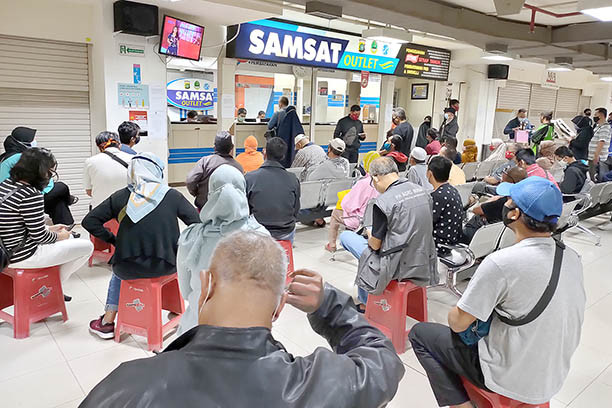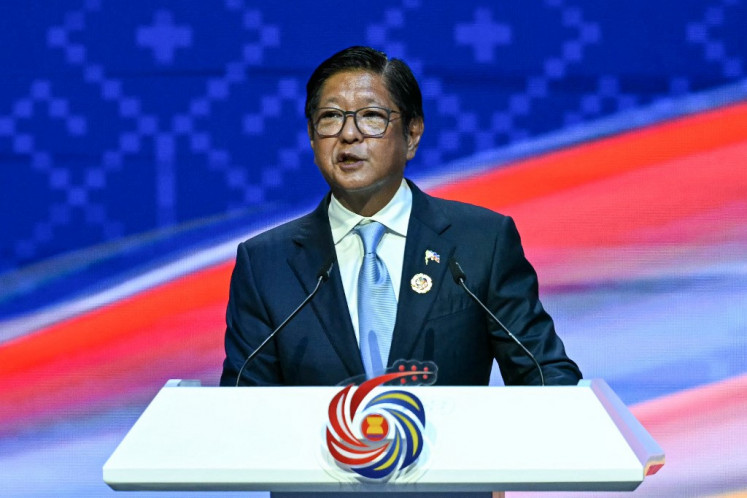Popular Reads
Top Results
Can't find what you're looking for?
View all search resultsPopular Reads
Top Results
Can't find what you're looking for?
View all search resultsRegional fiscal management
Better matching local revenue to local spending strengthens local responsibility and accountability.
Change text size
Gift Premium Articles
to Anyone
 Better late than never: Vehicle owners wait for their turn to pay vehicle tax at ITC Depok in Depok, West Java, on Nov. 10, 2020. The West Java provincial administration is waiving penalties for late vehicle tax payments and other vehicle-related fees to reduce the burden on vehicle owners amid the COVID-19 pandemic as well as to woo owners to pay their vehicle taxes. (JP/Ricky Yudhistira)
Better late than never: Vehicle owners wait for their turn to pay vehicle tax at ITC Depok in Depok, West Java, on Nov. 10, 2020. The West Java provincial administration is waiving penalties for late vehicle tax payments and other vehicle-related fees to reduce the burden on vehicle owners amid the COVID-19 pandemic as well as to woo owners to pay their vehicle taxes. (JP/Ricky Yudhistira)
T
he media did not pay much attention to the deliberations and public debates at the House of Representatives on the bill on fiscal relations between the central government and regional administrations that was passed into law on Dec. 7.
But we should give credit where credit is due. The new law, which also amends Law No.28/2009 on regional taxation, will extensively reform the fiscal management of provincial, regency and city administrations, making their budgets more focused, efficient and in synergy with the central government budget.
The rationale is quite obvious. The effectiveness of any policies adopted by the national government depends on how these policies are enforced or implemented in the regions – the 34 provinces, 416 regencies and 98 cities. The performance of the whole national economy also depends on economic activities in the regions. Put another away, the gross domestic product subsumes gross regional products.
The law strengthens the stick-and-carrot mechanism or performance-based budget system through the reform of local taxes and service-based levies, including user charges and better tax-revenue sharing ratios. This will enable regional administrations to increase their own revenues and reduce their dependence on transfers from the central government, which still averages about 75 percent of their total income.
Better matching local revenue to local spending strengthens local responsibility and accountability. If the taxes are borne by the local people, it promotes local civic participation in direct regional elections. Local people feel less ownership of transfers from central governments and are less likely to hold local politicians accountable for how these revenues are used, like what happened before 1983 when the oil and gas profit windfalls caused the government to ignore personal income tax collection.
For example, the ceiling of the property and land tax rate will be raised from 0.3 percent to 0.5 percent and the receipts of this tax will be allocated entirely for regional administrations with the bulk, over 65 percent, for regency or municipal administrations and the remainder for provincial administrations. The tobacco tax revenue share for the originating jurisdictions will be increased to three percent.
The law will reduce the number of regional taxes from 16 to 14 and service fees or user charges from 32 to 18. But since this measure will encourage more investment and businesses, regional administrations will get more receipts under the personal income tax-revenue sharing mechanism. Moreover, the more investments enter an area the higher the value of the local property will be. This will contribute more property tax receipts to local administrations.
The law also will instill higher discipline in regional fiscal management by prohibiting regional administrations from using more than 30 percent, now an average 65 percent, of their general-purpose grants from Jakarta for personnel expenditures. They are required to use 40 percent of their grants from the central government on public infrastructure or facilities and services.
Heavier penalties also will be imposed on regional administrations which are very slow in implementing their capita, or development budget. As of November, for example, regional administrations have disbursed only 56.36 percent of their investment budget due to inadequate institutional capacity and structural barriers such as complex procedures and seasonal direct elections of regional leaders.










